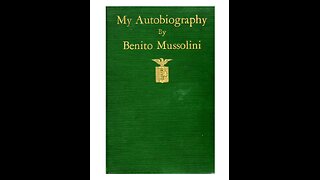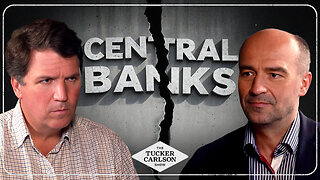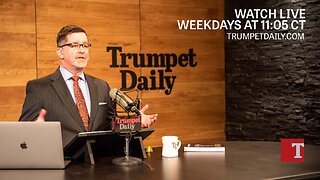Premium Only Content

"Winter is Coming" by Gary Kasparov, A Dalek Precis
Welcome to the Dalek Channel, Thank you for watching.
Today we are pleased to present a precis of Gary Kasparov’s book "Winter is Coming" published in two thousand and fifteen.
=========================
This is not an endorsement or a criticism,
merely an attempt at an abridgement.
=========================
In nineteen eighty seven, Gorbachev said he wanted to build Alexander Dubcek’s “socialism with a human face,” to which I responded that Frankenstein’s monster also had a human face. Communism goes against human nature and can only be sustained by totalitarian repression. Without outside assistance, or massive amounts of natural resources like oil, repression leads to economic stagnation. Then there is the moral and spiritual stagnation of a society were individual success and excellence are all but forbidden.
Well before the Wall came down, it was clear to many of us on the “wrong” side of the Iron Curtain that major changes were inevitable.
On March 26, nineteen eighty nine, the USSR held its first real election since its formation.
Among the independent insurgents was Boris Yeltsin, who won the Moscow district overwhelmingly over Gorbachev’s candidate.
Putin and other ex-Soviet autocracies view what happened in Gorbachev’s regime as a negative case study.
The color revolutions associated with the pro-democracy Rose movements in Georgia in two thousand and three and Orange in the Ukraine in two thousand and four also provoke fear among the autocrats.
But it is the Soviet experience that truly scarred Putin and the rest and that continues to shape their worldview and their behavior.
It is much harder to maintain stoicism in the face of adversity when you find out your neighbors are doing much better than you are. Everyone has the same kind of normal human aspirations.
There were plenty of myths and misunderstandings about the dissolution of the USSR. The danger of hardliners kicking out Gorbachev or the Communists coming back and beating Yeltsin was considered too great. The brief August nineteen ninety one coup by hardliners against Gorbachev, whether it was real or of Gorbachev’s own desperate orchestration, resulted in an immediate bump in American aid.
Ironically, the roots of Russia’s descent back into totalitarianism can be traced to the West doing too much to respect the legacy of the USSR as a great power, not too little.
This sentiment, feeling like losers, was a consequence of failing to move on from the nation that vanished under our feet. The USSR lost the Cold War, but it was a victory not just for the United States and the West, but for Russians and all Soviet citizens and everyone living behind the Iron Curtain.
This left Russia and other former Soviet states vulnerable to the humiliation myth and to men like Putin eager to exploit it.
Many today seem to have forgotten that the fall of the Iron Curtain, the end of the Cold War, and the collapse of the Soviet Union were distinct events.
The transformation was remarkably peaceful, with the notable exception of the execution of vile Romanian dictator Nicolae Ceausescu, who had ordered his troops to fire on anti-government protestors and where an estimated eleven hundred people were killed during the violence.
With enough problems already stemming from the nineteen eighty nine revolutions, NATO and the Western powers were happy to ignore the initial phases of the Yugoslav wars as internal problems.
Communism is like an autoimmune disorder; it doesn’t do the killing itself, but it weakens the system so much that the victim is left helpless and unable to fight off anything else. It destroys the human spirit on an individual level, perverting the values of a successful free society.
In nineteen ninety two, the US economy of 6.5 trillion was nearly double Japan’s, triple Germany’s, and thirteen times larger than China’s.
Bush did speak boldly and eloquently on the importance of American leadership, however.
If the United States does not lead, there will be no leadership. It is our great challenge to learn from this bloodiest century in history. If we fail to live up to our responsibilities we will one day pay the highest price once again for our neglect and shortsightedness.
But Bush showed that rote support for UN policy meant more to him than saving tens of thousands of lives, and more than presenting a strong stance against aggression.
By the time NATO finally intervened militarily over two years later in the first combat action in its history, an estimated 140,000 people were dead and millions of people had been displaced.
Seventy-nine days after the NATO air campaign began, Serb forces withdrew from Kosovo and nearly a million people were able to return to their homes.
Once again the seasons are changing and new threats have been allowed to flourish and to escape their borders.
Most European nations are largely populated by the ethnic groups that have been there for centuries.
Soviet propaganda was also expert in what-about-ism. What about how you Americans treated the Native Americans and the slaves?
The United States is called a melting pot or a salad bowl. The Soviet Union was a very different creation, and food metaphors fall short.
The total failure of the USSR to move beyond that legacy of invasion and repression in seventy long years was clearly reflected by the eagerness with which the various republics detached from the rotting head of the Kremlin as soon as they had a chance.
Most people today have heard of Chechnya, and always for negative reasons.
Letting Chechnya and its ultraviolent neighbors become independent was never going to appeal to Russian leaders.
Dealing with a failed Russian state was bad. Dealing with a failed neighboring country was much worse.
Instead of tying foreign aid and foreign policy to the immoral slaughter of civilians in Chechnya, Clinton expressed concerns, made vague remarks and called it an internal affair.
Nineteen ninety-four was the year the leaders of Russia, Ukraine, the US, and the UK all signed the Budapest Memorandum on Security Assurances. Ukraine was giving up the third-largest nuclear arsenal in the world under heavy pressure from Russia and the United States.
There were no means of enforcement in the memo and the only promised response is to seek UN Security Council action if Ukraine should become a victim of an act of aggression or an object of a threat of aggression in which nuclear weapons are used.
The United States looked all powerful at the end of the Cold War, like the Wizard of Oz before the curtain was pulled back. By nineteen ninety nine, when Clinton finally got it right in Kosovo, the curtain had been pulled back, torn down, and burned in effigy.
As convenient as it would be to put all the blame for the collapse of Russian democracy on Putin, the truth is more complicated.
If the road to hell is paved with good intentions, compromises on principles are the streetlights. Here is where we come to one of the most difficult concepts to explain to outsiders about the Russian rejection of democracy. So when we happily mobbed the polls in 1991 to vote for Yeltsin the first time it was as if many Russians expected the ballot boxes to operate like ATMs: put your ballot in and money will come out!
And yet the lesson of 1996 is that institutions must matter more than the man. The Yeltsin campaign undermined nearly every aspect of a democratic society and it never recovered.
The pro-democracy sit-in protests in Hong Kong that started in September two thousand and fourteen led to speculation about why such an Occupy-style movement has so far failed to materialize against the dictatorship of Vladimir Putin in Russia.
A Tiananmen massacre in Hong Kong, transmitted around the world on millions of Chinese-made iPhones, could make Made in China into a bloody mark.
Putin, on the other hand, has no use for the people of Russia, especially its young and educated people.
China and Russia have similar social compacts with their dictatorial governments: economic stability in exchange for their citizens’ human rights.
There were two wars in Europe in nineteen ninety nine, both sequels to wars that had concluded just a few years earlier. Kosovo also demonstrated that the United Nations in its current form was, and is, irrelevant when it comes to solving such crises.
Had the Western powers been firm about Russia’s true status and used that as leverage to encourage transparency and reform, we would all be much better off today. The UN’s goal of freezing the status quo between two nuclear superpowers was obsolete.
The type of evil Milosevic represented has always been difficult to understand. He was urbane, intelligent, and able to present himself to different people in ways that flattered them and made them trust him.
And in both Kosovo and Chechnya, the war was part of a fight for political power in a distant capital. Eight years of so-called reforms left a small group of elites fantastically wealthy, while a huge and potentially explosive segment of Russia’s population remained impoverished.
Instead of transparency and the strong medicine Russia needed, we were fed placebos and told we were going to get well soon. In August nineteen ninety one, when Boris Yeltsin’s administration took over, the majority of Russians were prepared for a partnership with the civilized world.
On August 9, nineteen ninety nine, the largely unknown Putin was, to the great surprise of nearly everyone, put in charge of the Russian government. The public cheered Putin as their new gladiator and enjoyed the rough, even profane language he occasionally used when talking.
We were forced to contemplate just how far Yeltsin, Putin, and their backers might go to guarantee Putin’s election on the night of September 22, when local police in the city of Ryazan interrupted what would have been the fifth apartment bombing of the month.
A deep investigation and analysis of the case were turned into a devastating book by former FSB agent Alexander Litvinenko, Blowing Up Russia. The same Litvinenko, who had become a fierce Putin critic, was assassinated in London in two thousand and six with the rare radioactive substance polonium-210.
With the apartment bombings to fan the flames of vengeance, the assault in Chechnya gained force.
A decree granting Yeltsin and all his relatives freedom from prosecution was signed the same day Putin took office, revealing the real reason Yeltsin had selected him for his successor: self-preservation. Despite his faults and fall from grace while in office, Yeltsin was a true freedom fighter. The long lines of Russians who waited to view Yeltsin’s coffin and pay their respects at a Moscow cathedral demonstrated that despite his many failures people sensed the possibility for good in what he attempted.
George Soros was a participant in and a witness to many of the events around the attempts to reform and rebuild the Russian economy in the post-Soviet years. In February two thousand, the famous investor penned an article in Moskovsky Novosti.
With no free media, no justice system to worry about, and no competition, Putin’s preferred oligarchs were like vermin whose natural predators had been eradicated
Putin restored the old Soviet anthem. The symbolism of bringing back the Soviet music was both obvious and shocking. The words change, but the song remains the same.
As soon as Putin appeared on the international stage, every foreign leader and pundit was obliged to have an opinion about him. Only a rare few have the honesty to admit they were mistaken about Putin, or worse, that he fooled them.
Nuisances left unattended grow into real problems. If I may take the liberty of boiling Solzhenitsyn’s prose into an aphorism, the most moral policy also turns out to be the most effective policy. Believing otherwise leads to false trade-offs that imperil liberty without enhancing our security.
Any doubts about the Putin regime’s willingness to spill blood were erased in the two thousand and two hostage crisis at the Dubrovka Theater in Moscow. All 40 hostage-takers were killed in the raid along with over 130 hostages: all but one of the hostages were either killed by the gas directly or indirectly by choking to death while unconscious and failing to receive medical care in time.
On September 1, two thousand and four, Chechen separatists took over eleven hundred hostages at a school in North Ossetia, a Russian region of the Caucasus bordering Georgia. The final numbers are 334 dead hostages, of which 186 were children.
Only three officials were ever charged over what happened at Beslan. All three were local North Ossetian police officers who were charged with negligence for failing to protect the school.
Only three officials were ever charged over what happened at Beslan. All three were local North Ossetian police officers who were charged with negligence for failing to protect the school.
Nothing symbolized the lack of will to stand up to Putin than the G8 Summit in St. Petersburg held July 15-17, two thousand and six.
It took Putin’s invasion of Ukraine in 2014 to finally get Russia’s G8 membership suspended.
Economic engagement kept the billions coming in that Putin needed to expand his repression at home. Instead of these contacts helping to liberalize and modernize Russian business practices, the flow went the other way. Russia’s biggest export was corruption, not oil or gas.
It became a perverse combination of Adam Smith and Karl Marx in which the profits were privatized and the expenses were nationalized.
The Kremlin was not changing its standards; it was imposing them on the outside world. The mafia corrupts everything it touches. Bartering in human rights begins to appear acceptable. When everyone is guilty, no one is guilty, goes the logic.
The central myths of engagement are that it liberalizes the unfree states and provides leverage over them if they don’t liberalize. The first has proven false. The second has failed because the free world refuses to exploit its leverage the way dictatorships are so eager to do.
Tragically, it wasn’t much better outside of Russia. Heads of state had no interest in challenging Putin; that had been obvious for quite a while.
As long as the money kept rolling in to buy Russia’s vast natural wealth-oil, gas, metals, timber-Putin could afford the salaries, benefits, and armies of riot police that kept people at home.
In two thousand, when Putin took charge, there were no Russians on the Forbes magazine list of the world’s billionaires. In two thousand and eight there were eighty-seven, more than Germany and Japan combined, in a country where 13 percent of our citizens were under a national poverty line of 150 dollars a month.
By 2008, Obama’s promises to bring the troops home, and keep them home, was only telling the American people what they wanted to hear.
Mitt Romney had said Russia was without question our number one geopolitical foe. Obama ridiculed Romney for the remark, even preparing a debate zinger about how the nineteen eighties want their foreign policy back.
The most powerful theme in Orwell’s book is not that of the all-seeing Big Brother, but that of the control and distortion of language, especially in the form of newspeak.
Brutal totalitarianism does not begin with surveillance by a liberal democratic state.
It begins with terror, it begins with violence, and it begins with the knowledge that your thoughts and words can end your career or your life.
It’s a tragedy that the free world always refuses to learn from past mistakes where dictators and would-be dictators are concerned. The autocrats, in contrast, are eager students of their predecessors.
At the end of February two thousand and fourteen, for the second time in six years, Vladimir Putin ordered Russian troops across an internationally recognized border to occupy territory. Putin once again refuted the predictions of his defenders in the West and continued his invasion of Eastern Ukraine.
This fecklessness was sad and expected, but I thought it might finally come to an end on July 17 when Malaysia Airlines flight 17 was blown out of the sky over Eastern Ukraine by a surface-to-air missile, killing all 298 people aboard.
But if thought corrupts language, language can also corrupt thought. The Western rhetoric of appeasement creates a self-reinforcing loop of mental and moral corruption.
Putin won’t back down or be kicked out of Ukraine until credible threats to his power create a split among his elites and advisors. The Russian military commanders, the ones in the field, are not fools.
Putin is no master strategist. He’s an aggressive poker player facing weak opposition from a Western world that has become so risk averse that it would rather fold than call any bluff, no matter how good its cards are. The best reason for acting to stop Putin today is brutally simple: it will only get harder tomorrow.
It is impossible to pinpoint the exact moment at which we stopped looking for leadership from our leaders and started caring only about realpolitik and lesser evils. And, of course, Western complacency has enabled all its enemies, not just Putin. As with Hitler and Stalin, a man traveling to the moon is mostly remembered today as mythology.
In his renowned iron curtain speech, Winston Churchill spoke about the new dangers to freedom, this time from Communism. It is almost forgotten that he also warned how the newly formed United Nations could fail.
Anti-modernity is a dangerous virus, and to remove a virus a reboot or a reset is not enough. We have to build a values-based system that is robust enough to resist the virus at home, smart enough to stop it before it spreads, and bold enough to eradicate it where it grows.
References:
Winter is Coming
Gary Kasparov 2015
Library of Congress Control Number: 2015948564
ISBN 978-1-61039-645-5 (international paperback)
George Soros Moskovsky Novosti Feb 2000
http://www.cdi.org/russia/johnson/4135.html
-
 7:38:15
7:38:15
PukeOnABook
25 days agoMy Autobiography, By Benito Mussolini 1928. A Puke(TM) Audiobook
451 -
 LIVE
LIVE
The Mel K Show
1 hour agoMORNINGS WITH MEL K - An Engaged Fed Up Citizenry is Finally Moving the Needle Towards Accountability 7-29-25
944 watching -
 LIVE
LIVE
LFA TV
14 hours agoLFA TV ALL DAY STREAM - TUESDAY 7/29/25
4,285 watching -
 1:10:32
1:10:32
The Rubin Report
1 hour agoMidtown Tower Shooting Causes Resurfaced Bill Maher Clip to Go Viral
9.36K13 -
 2:42:17
2:42:17
Tucker Carlson
23 hours agoRichard Werner Exposes the Evils of the Fed & the Link Between Banking, War, and the CIA
61K110 -
 LIVE
LIVE
Flyover Conservatives
11 hours agoIs THE Church Necessary? What is the Church? 5 Fold Ministry. - Wanda Alger | FOC Show
234 watching -
 LIVE
LIVE
The Shannon Joy Show
2 hours ago🔥🔥Small Town Activists HALT Geo-Engineering Scheme In Alameda, California PROVING That Localism Beats Globalism!🔥
146 watching -
 LIVE
LIVE
Grant Stinchfield
45 minutes agoThe War on Real Food... How Corporate Giants Hijacked Your Dinner Plate
106 watching -
 LIVE
LIVE
Trumpet Daily
37 minutes agoTrumpet Daily LIVE - July 29, 2025
482 watching -
 LIVE
LIVE
JuicyJohns
4 hours ago $1.47 earned🟢#1 REBIRTH PLAYER 10.2+ KD🟢 !loadout
111 watching